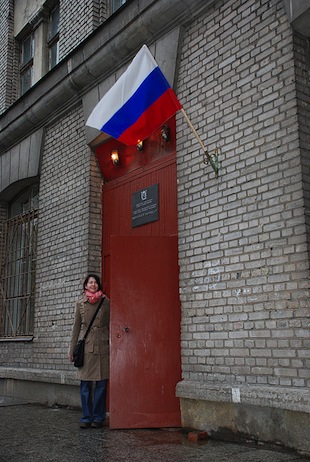MOSCOW, RUSSIA. We the Scholars of a new U.S.-Russia research federation report our latest findings:
First, Walter Lippmann got it right in his book “Public Opinion” when he explained “The World Outside and Pictures in Our Heads” in 1922. Today the pictures in our heads, thanks to journalists, explain why people say squirrely things when their American friend is in Russia:
“Thanks for taking care of the chemical weapons problem” or “See if you can solve the Syria and Iran issues while you are there.”
Second, when Russians are presented with a provocative new idea, they tend to begin their responses with “The problem is …” Translation: Remember, you’re in Russia and you have no idea of the history and bureaucracy that stands in the way.
Third, the boom of young voters in America has an echo in Russia. While the Citizen Kentucky Project at the University of Kentucky in America is exploring whether young voters can swing a U.S. Senate race, a scholar at Lomonosov Moscow State University in Russia is marveling at the surge of young voters in Moscow’s mayoral election.
In early September last year, the face of Russian politics grew youthful and brighter when young voters took to the streets to support an upstart candidate, Alexei Navalny, who likened President Vladimir Putin’s regime to a stubborn “toad” on an oil pipeline.
Although he lost, Navalny, 37, a Moscow attorney, emerged as Russia’s leading opposition politician with his strong showing.
The rise of a post-Soviet younger generation of activists in Russia coincides with what the Pew Research Center suggests has occurred with America’s young voters, 18 to 29 years old.
Those young voters, particularly in Florida, Ohio, Virginia and Pennsylvania, swung the electoral college to re-elect President Obama in 2012, according to Pew. If the voting age were 30 in those swing states, Pew research suggests, America would have elected President Mitt Romney.
What impact young voters will have in Kentucky in the May 20, 2014, primary election for U.S. Senate is about as clear as Navalny’s political future.
In mid-October Navalny skirted a five-year prison term with a suspended sentence from a judge who barred him from politics, at least for now.
As the scholar at Russia’s leading journalism school studies the Navalny Effect, her counterpart as director of the Citizen Kentucky Project wraps up a study of young voters in the U.S. Senate race by a University of Kentucky Honors Program class.
In the Fall semester, the research project involved a focus group, a content analysis of newspaper headlines, a survey, a mock election, and a study of journal entries by young voters in a case study on “coming to public judgment.”
For young voters the key determinant was party affiliation. In a 2010 Citizen Kentucky study of young voters, neither party affiliation nor news coverage was a key determinant for young voters.
In 2010 during the last U.S. Senate race in Kentucky that elected eye surgeon Rand Paul, the student newspaper’s Opinions page editor did not want party affiliation mentioned in a voter guide. Instead, he just wanted credentials and stands on issues.
Maybe today’s hyper-partisan politics is having an effect on our young people.
Other key determinants for the young voters in 2013 were morality, including a candidate’s position on abortion, political experience, and dissatisfaction, or the “throw-the-bums-out” factor.
The same freshman Honors students conducting the research project organized Constitution Day at UK 2013 in September with Tea Party candidate Matt Bevin, U.S. Sen. Mitch McConnell’s campaign manager Jesse Benton, Libertarian Party candidate David Patterson (with gun on belt), actors playing Henry Clay and Betsy Ross, a choir from Christ the King School and about 200 other good citizens.
In Russia the fire that lit up young voters was fueled by voter fraud, corruption and a Putin power play. In Kentucky young voters are still looking for the matchbox.
We the Scholars vow to keep an eye on young voter trends, as the future of our two countries depend on them.

